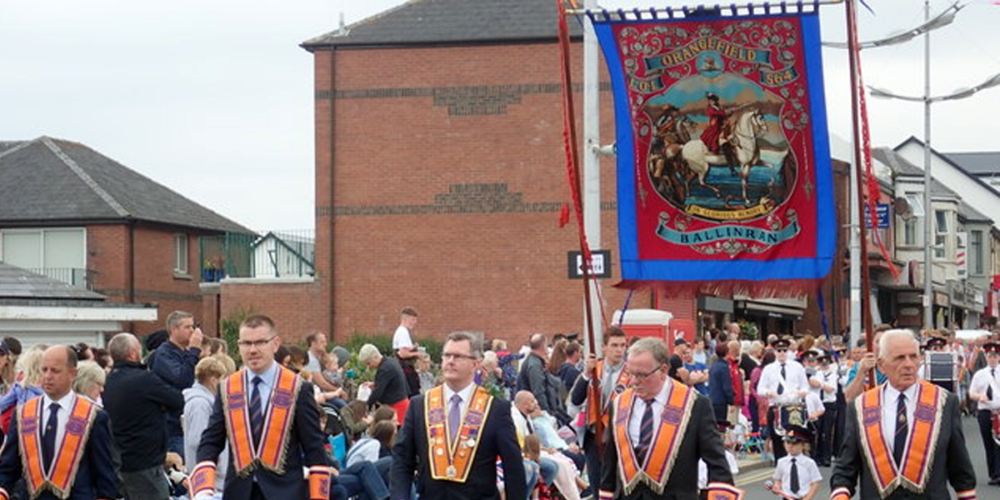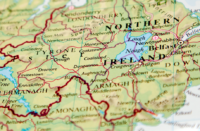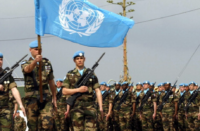Jeffrey Donaldson’s speech to the DUP annual conference last month generated more interest than is normally the case for this event. The mainstream media concentrated not only on his support for a devolved administration but also his tacit acceptance of a Sinn Féin First Minister. Nevertheless, when viewed in its entirety his speech revealed much more than that.
His address illustrated the extent of the dilemma facing unionism, and how difficult it will be for its supporters to find an answer to their satisfaction. In reality, the North’s political process has not just stalled: it is fundamentally flawed.
Reading Donaldson’s speech leaves little doubt that he recognises the enormity of the challenge faced by unionism, although it is still not prepared to envisage an end to the union. In his effort to maintain Northern Ireland as a viable political entity, Donaldson is faced with the nigh-impossible task of appeasing the irreconcilables among his supporters while promoting a pragmatic agenda.
Aware that the present deadlock is detrimental to the unionist cause, he states bluntly that his supporters must not allow republicans to promote a claim that “Northern Ireland is a failed and ungovernable political entity . . .” The question is, though, how he proposes to fix this situation.
Several important points emerged throughout his analysis. To avoid the aforementioned failed and ungovernable entity, he was adamant that it is essential to restore the devolved administration at Stormont. Moreover, he was quite explicit in his rejection of direct rule from London, going so far as to say that “Westminster has imposed laws upon us that are not in tune with the needs or wishes of the people of Northern Ireland . . .”
Significantly, Donaldson emphasised throughout his address the need for achieving widespread support, saying that it is important to set about “restoring cross-community consensus that is essential for the political institutions to be re-established . . .”
So far so good and, up to a point, all very plausible. Nevertheless there still remains the major obstacle that is the Protocol and the Windsor Framework. And this really is a sticking-point, as Donaldson had to admit that, in spite of his best efforts to force the issue, the British government’s proffered resolution fails to meet the seven crucial points identified by his leadership colleagues and, more ominously, the party grass roots.
It is at this point that the matter becomes increasingly problematic for the DUP. As outlined above, it is clear that Donaldson and his closest advisers are convinced of the need, if not the imperative, to restore devolved institutions. They are aware too that the current British government is unlikely to make further major adjustments to its agreement with the European Union vis-à-vis the Protocol. Nor is it likely that a future Starmer-led government would be prepared to sour relations with Brussels in order merely to please the extremes of Northern Irish unionism.
The prolonged existence of an intractable impasse would, they realise, ensure the type of “failed and ungovernable entity” that would give rise to an irresistible demand for a border poll. Realists within the DUP leadership know that the result of such a referendum is no longer a foregone conclusion. Changing demographics, fractures within wider unionism, malfunctioning health and social services and an economy falling far behind that of the Republic are all factors arguing against the maintenance of the union.
Hence Donaldson’s plaintive call to all members of the party to be prepared “to face up to new realities and adapting to new circumstances,”all the while insisting that this has to be done in order to protect Northern Ireland’s place within the United Kingdom. Elsewhere he says, significantly, that the DUP will have to determine whether there is a sustainable basis for moving forward.
It would be a mistake to doubt his sincerity or his commitment to maintaining the union, or his conviction that retaining the connection is possible. It seems, therefore, that he is preparing to modify certain DUP positions although without specifically saying as much. Whether he can manage this manoeuvre without risking a mutiny is far from certain.
To effect his plan he has made a pitch to London for assistance. Contained within an unusually long leader’s address were several suggestions in what are a set of proposals appealing in effect to the British government. This he has done with a view to winning a Westminster package offering sufficient political space to facilitate the breaking of the present impasse and allow a return to Stormont.
Among the points are a request that the British government establish an East–West council of the United Kingdom, a body that pointedly excludes the Republic. The thinking behind this initiative is surely to provide a comfort blanket for those spooked by the presence of minor customs checks at Larne and the absence of these at Newry.
Then there is the emphasis on a need for a financial sweetener—specifically, £1 billion for the health service and the funds for providing thirty hours’ free child care per week (as already exists in England), as well as a five-year plan to enhance the economy in general.
From all this it is now almost certain that speculation about the DUP’s return to Stormont is most probably based on fact. What is not at all certain is how this will go down with hard-line unionists. After all, it’s not all about customs checks in the Irish Sea: there will be, for many, the difficult-to-accept spectacle of Michelle O’Neill of Sinn Féin stepping into the role of Northern Ireland’s First Minister.
Then there is the disturbing prospect of Michael O’Neill (no relation) eventually leading his players out onto the exchequer-funded turf of Roger Casement Park in republican West Belfast.
With Jim Allister and his TUV only too willing to rubbish any compromise, the Donaldson gambit is not guaranteed to succeed. There may also be more than a few disenchanted members of his own party willing to pull the rug from under their leader’s feet. It would be ironic indeed to see Donaldson suffer the same fate that he helped inflict on David Trimble twenty-five years ago.
Nevertheless, and no matter what the immediate outcome, a partitioned northern entity will remain an unstable political anomaly.





